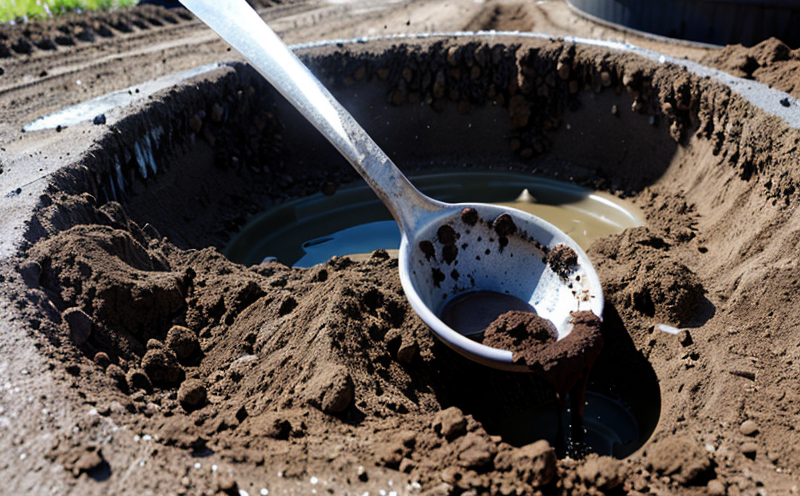APHA 2540I Fixed Solids in Biosolids Test
The APHA 2540I Fixed Solids in Biosolids Test is a critical procedure within the water and wastewater sector, primarily used to determine the amount of fixed solids present in biosolids. This test is essential for quality control, compliance, and environmental management in the treatment of organic waste materials.
The APHA 2540I method involves drying a sample of biosolids at specified temperatures (103 ± 2°C) to remove volatile matter, leaving behind only the fixed solids. The dried material is then weighed to calculate its percentage by weight relative to the original sample mass. This process ensures that any changes in the moisture content do not affect the measurement of fixed solids.
The significance of this test lies in its ability to provide accurate and reproducible data on the composition of biosolids, which are a key component in wastewater treatment processes. The test results help quality managers and compliance officers ensure that the biosolids meet regulatory standards set by environmental agencies such as the U.S. Environmental Protection Agency (EPA) or equivalent international bodies.
The APHA 2540I method is widely recognized and is referenced in several international standards, including ISO 16739:2013 for sludge characterization. The precision of this test makes it a cornerstone for R&D engineers working on optimizing wastewater treatment processes. By accurately measuring fixed solids content, they can fine-tune their methods to maximize efficiency and minimize resource use.
The impact of such testing extends beyond just the laboratory; it affects environmental policies, public health, and the overall sustainability of water management practices. The test results are also crucial for procurement officers who need to verify that suppliers meet quality standards, ensuring the reliability of raw materials used in wastewater treatment processes.
- Customer Impact: By providing accurate data on fixed solids content, this test helps customers comply with environmental regulations, optimize their operations, and ensure product consistency. It supports decision-making processes related to waste management and resource allocation.
The APHA 2540I method is not just a laboratory procedure; it represents a vital link in the chain of environmental stewardship. Its accuracy ensures that biosolids are managed responsibly, contributing to cleaner environments and more efficient water treatment processes worldwide.
Eurolab Advantages
EuroLab offers unparalleled expertise in executing the APHA 2540I Fixed Solids in Biosolids Test. With a team of highly qualified scientists and state-of-the-art facilities, we ensure that every test is conducted with precision and accuracy.
Our laboratory adheres strictly to international standards such as ISO 16739:2013 for sludge characterization, ensuring consistent and reliable results. Our advanced instrumentation guarantees that each sample undergoes rigorous quality checks before analysis, leading to trustworthy data.
The proficiency of our staff is complemented by the latest technology in laboratory equipment, which enables us to perform complex tests efficiently and effectively. This commitment to excellence ensures that we meet or exceed customer expectations for every project.
At EuroLab, we pride ourselves on providing not just a service but a comprehensive solution tailored to your specific needs. Our team works closely with clients to understand their requirements, offering customized testing packages that deliver value-added insights beyond mere compliance.
Why Choose This Test
The APHA 2540I Fixed Solids in Biosolids Test is a cornerstone of wastewater treatment and sludge management. Its importance cannot be overstated, as it provides critical insights into the composition of biosolids, which are at the heart of effective waste-to-resource strategies.
The fixed solids content not only informs on the efficiency of wastewater treatment processes but also influences decisions regarding the disposal or utilization of biosolids. Understanding these components allows for better resource management and can lead to innovative solutions in recycling and composting.
Compliance with regulatory standards is another key reason for choosing this test. Agencies like the EPA require accurate measurements of fixed solids content to ensure that waste materials are managed responsibly, minimizing environmental impact. By adhering to these standards, organizations demonstrate their commitment to sustainable practices.
The data from this test can also inform research and development efforts aimed at improving wastewater treatment technologies. Engineers and scientists rely on such precise information to innovate and refine processes, ultimately leading to more effective and environmentally friendly solutions.
In summary, the APHA 2540I Fixed Solids in Biosolids Test is essential for maintaining compliance with environmental regulations, optimizing resource use, and driving innovation in waste management. It provides a reliable foundation upon which sustainable practices can be built.





